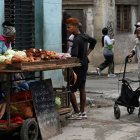Report: The poverty rate in Cuba stands at 89%
The Cuban dictatorship has increased misery for citizens year after year. Disapproval of the communist regime has reached a record high, and seven out of 10 Cubans have stopped eating breakfast, lunch or dinner due to lack of money or food shortages.

Cuban President Miguel Díaz-Canel
The humanitarian crisis in Cuba will not cease as long as communism remains in power. Under Miguel Díaz-Canel, the Caribbean country has plunged into extreme poverty. Food shortages, something that forced the regime to asks for help from the United Nations (U.N.), countless power cuts and skyrocketing inflation have all hit the country hard.
This serious situation, which has led to continued protests against Díaz-Canel's dictatorship, is reflected in a report by the Cuban Observatory of Human Rights (OCDH), which pointed out that the poverty rate stands at 89%, one point above last year's record.
The organization, based in Madrid, Spain, analyzed the humanitarian crisis based on the problems that Cubans define as the main difficulties afflicting the country. For 72%, food shortages are the biggest problem, followed by blackouts (55%), inflation or cost of living (50%), wages (49%), sanitation or public health (21%), and corruption (20%).
"These data reflect the situation of poverty, food and medicine shortages and the precariousness of elementary public services that hurt millions of Cuban families. The serious situation of social rights, together with the repression and the lack of confidence in the future, is at the basis of the growing migratory outflow that is being experienced," the OCDH points out.
"Seven out of 10 Cubans have stopped eating breakfast, lunch or dinner due to lack of money or food shortages. Eighty-nine percent rate Cuba's public health system negatively, and 33% were unable to acquire the medicine they needed due to price or scarcity," the organization added in its report.
Absolute rejection of the dictatorship
Disapproval of the communist regime has reached its highest mark. "Disapproval of the government's economic and social management grew by five points with respect to the previous report and reached a record figure of 91%. Only 4% support the economic and social management of Miguel Díaz-Canel," the OCDH details in its study.
"This issue should also provoke reflection in Latin America, where not a few politicians and academics have uncritically accepted the Cuban government's propaganda about its idyllic social model, some even going so far as to propose it for their own countries. The Cuban people in the region need more people committed to accompanying them in the construction of a free and just society," the organization concludes.
In recent months, protests against the communist regime have intensified in the country's main cities, such as Havana and Santiago. Díaz-Canel and his cabinet have repressed these demonstrations with increasing violence.


























